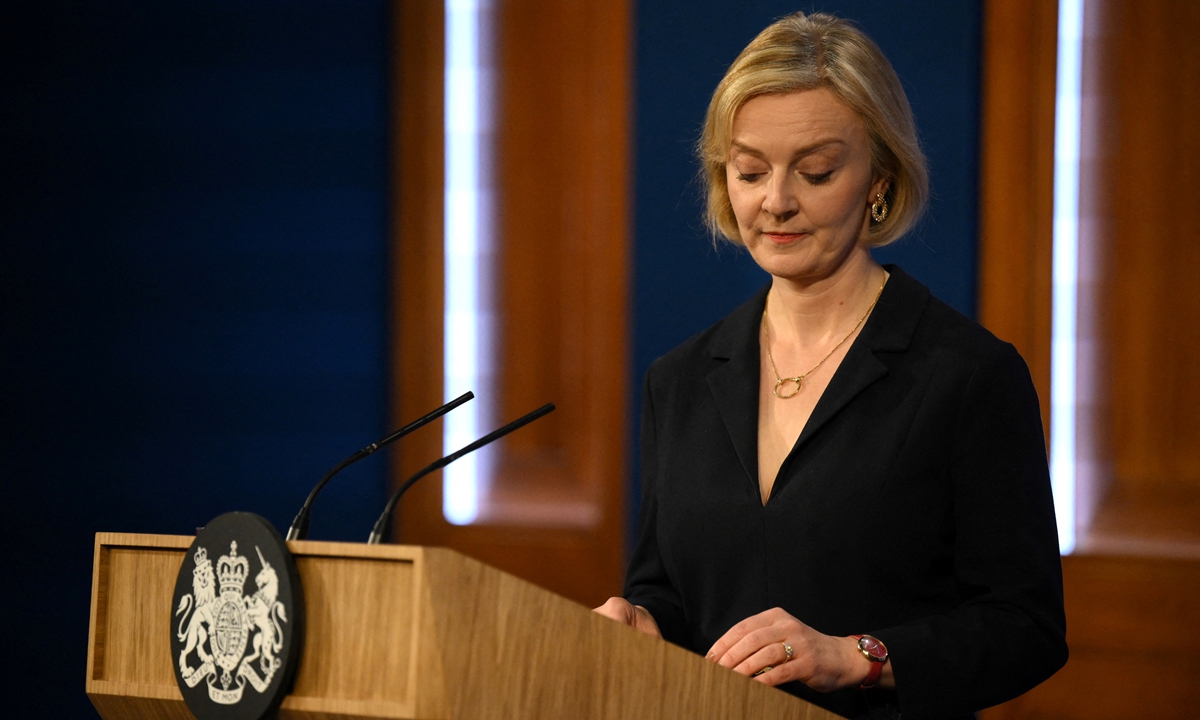
Britain's Prime Minister Liz Truss looks down during a press conference in the Downing Street Briefing Room in central London on October 14, 2022. Photo:AFP
While Liz Truss is the architect of her own troubles in the UK right now, it is the financial markets that possess the mechanisms which will ultimately bring her down.
When they saw that the economic stability, which they crave and on which their profits depend, was threatened by her preposterous policies, they acted to protect themselves. If that meant possibly bringing down an outspoken devotee of free market capitalism, then so be it.
Capitalism doesn't care about the sovereignty of any state. It doesn't care about individuals, their intentions or philosophies, or even the well-being of millions of people who are hopelessly dependent on their nation's economy. In the great capitalist scheme of things, capitalism doesn't care about any of that, beyond the simple extent to which these things can serve capitalism.
Truss, in office barely six weeks, has caused a period of financial tumult with a controversial mini-budget, which included unfunded tax cuts, undermining confidence in her government and in the UK' currency. Last week, she sacrificed her chancellor Kwasi Kwarteng (in office for barely 38 days). She sacked him for implementing the very fiscal measures central to her own economic strategy. She also reversed several key measures that were fundamental to that strategy. Why? Because the markets told her to.
The markets' response to the mini-budget caused sterling to nose dive, pension funds to panic, banks to hike mortgage interest rates for millions of householders, and the Bank of England to pour in tens of billions of pounds worth of support. Truss responded by dumping Kwarteng and promising to retain a scheduled rise in corporation tax, which she had previously said she would scrap. To further steady investors' nerves, she also scrapped plans to abolish the UK's 45 percent higher tax rate, and she is proposing an increased tax take from energy companies, which sounds very like backtracking on a pledge she made to not introduce a windfall tax. Why? Because the markets told her to.
Truss was forced to dismantle her radical plans. This is because the markets exerted their influence. They have forced significant U-turns and even cost a chancellor his job. Will it stop there, or will they also force a prime minister out of office?
Unlike Margaret Thatcher, who famously declared herself a lady "not for turning" and on whom Truss rather embarrassingly styles herself, the current UK prime minister appears to be very much a lady for turning. Truss was prepared to cancel her government's economic plans just to appease the money markets. The financiers are back in control.
Some might argue that a readiness to acknowledge one's errors is a measure of strength in anyone, especially a national leader. Some might argue that it shows that the interests of the country are that leader's central focus. But with Truss, this is more than outweighed by her stubborn refusal at the outset to listen to voices of caution before the measures were announced and implemented, even to the point of admitting the potential - even the certainty - for catastrophic damage and claiming it was a necessary collateral for the policy to succeed.
Yes, self-awareness and humility in a leader, and the capacity to change course, can be a great strength - but not if that is happening all the time. In Truss' case, it has happened continually in what should have been the honeymoon period of her premiership, in which she could have been given the opportunity to prove herself. Now, she has been backed into a corner and her only course of action is submission.
The new chancellor, Jeremy Hunt, has already admitted that - contrary to Truss' original promises - there will be spending cuts to public services and tax rises. He has also declined to say whether he will honor Truss' pledges to increase defense spending to 3 percent of GDP and cut the basic rate of income tax for millions of people. He is doing what he thinks the markets want to hear and encourage confidence.
Governments can be hostages to fortune, or, more accurately, the blind economic forces of fortune hunters. Thirty years ago, on a day that became known as Black Monday, speculators broke the pound by shorting the currency and making themselves billions. The markets don't care.
Karl Marx said that capitalism contains the seeds of its own destruction. While he might not have foreseen the intricacies of a 21st century economy, he might have appreciated the irony capitalist interests doing damage to capitalist economies. Capitalism is like a snake devouring its own tail.
The author is a journalist and lecturer living in Britain. opinion@globaltimes.com.cn




